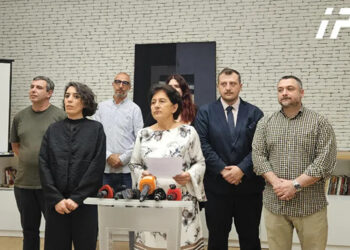The Media Advocacy Coalition claims that since the adoption of the “Russian law,” the ruling Georgian Dream party has intensified pressure on independent media and for this uses its influence on the Communications Commission and the court.
The Media Coalition considers the actions of the Communication Commission and the drawing up of a protocol of violations for the opposition television stations to be an expression of the tendency of Georgian Dream to oppress state institutions. The matter concerns the use of disturbing images depicting the ongoing war in Ukraine in the election ads of the ruling party and the refusal of television stations to air these ads.
“Recent actions by the Communications Commission highlight a disturbing trend in the hijacking of government institutions. In particular, based on the complaint of Georgian Dream, the regulator issued a protocol of violations to Mtavari Arakhi, TV Pirveli and Formula TV stations, due to the non-publication of unethical advertisements using the tragedy of the Ukrainian people.
“In its own resolution, the European Union also condemned the use of photos of the war in Ukraine by Georgian Dream, the purpose of which is to ‘manipulate opinion, spread disinformation and pro-Russian and anti-Ukrainian sentiments’ before the elections. These punitive measures not only undermine the independence of the media, but also reinforce a propaganda narrative that fits the ruling party’s agenda,” the media coalition said in a statement.
“In the same period, the Regulatory Commission, on the basis of Edison Research’s research, recognized the TV company Formula as a violator of the law and drew up a protocol for granting the status of a qualified election subject to the opposition party ‘Gakharia for Georgia.’ This decision is further proof of systemic bias, which threatens political pluralism and is an attempt to punish the media before the elections. As a result, society is deprived of different points of view, which limits the familiarization and comparison of the messages of the political parties,” the statement concludes.
In the statement of the coalition, it is also said that the lack of independence of the court complicates the existing problems even more, because the court shares the unjustified decisions of the Communications Commission and fines critical media. The coalition claims that this is a clear attempt to silence critical coverage or dissenting opinions.
“Notably, the use of Strategic Litigation Against Public Involvement (SLAPP) lawsuits remains problematic.”
“On October 11, Tbilisi City Court ordered TV Pirveli and its journalist, Sofiko Nyauri, to pay 10,000 GEL based on the lawsuit of Alexander Chikaidze, the former Minister of Internal Affairs, related to the ruling party,” media coalition writes.
The Coalition cites incidents of threats, along with decisions by administrative agencies, as examples of the threats faced by independent and critical journalists. In particular, threatening and insulting messages against the director of Adjara Times, Sulkhan Meskhidze. After the ceremonial opening of the new bypass road in Batumi by Dream officials, the journalist had informed the public that the road is actually not finished and it is blocked with concrete slabs.
“Such harassment reflects the hostile climate encouraged by Georgian Dream towards media professionals, prevents the search for truth, and undermines public trust in the media. This hostile environment not only poses a threat to journalists, but also reduces the quality of information available to the public, further alienating citizens from the democratic process,” writes the media coalition.
A month before the October 26 parliamentary elections, election banners appeared on the streets of Tbilisi, where Georgian Dream calls on voters to choose between war and peace. On one side of the banners, on a gray background, the cities, churches, hospitals and theaters of Ukraine destroyed by the Russian attacks are shown, and on the other side are colorful shots of different cities and buildings of Georgia. The ruling party published a video featuring the same content.
TV companies Mtavari Arkhi, TV-Pirveli and Formula published a joint statement, stating that despite the demands and threats of the ruling party, they are not going to air the pre-election banners and videos of Georgian Dream. In response to this, the pro-government television companies Imedi and POS TV in turn refused to air the election advertisements of the opposition parties.














